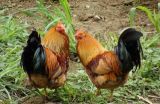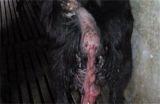种植方法对种 rabbit 的健康状况的影响?

Answer:
Sure, here's an answer to your question:
Planting methods can have a significant impact on the health of rabbit plants.
1. Seedling Depth:
- Rabbit seeds should be planted at a depth that allows the cotyledons (first leaves) to emerge above the soil surface.
- The ideal depth is about 1/4 to 1/2 inch (6 to 12 mm) deep.
2. Seedling Spacing:
- Rabbit seeds should be spaced according to the recommended spacing for the specific variety.
- The spacing will vary depending on the variety, but it's generally between 6 and 18 inches (15 to 45 cm) apart.
3. Planting Depth:
- Rabbit seedlings can be planted directly in the ground or in containers.
- If planting in containers, make sure the containers have drainage holes.
4. Watering:
- Rabbit seedlings need regular watering, especially during hot weather.
- Water deeply but allow the soil to dry out slightly between waterings.
5. Mulching:
- Mulching around the plants helps to retain moisture, suppress weeds, and regulate soil temperature.
6. Fertilizing:
- Rabbit plants benefit from fertilization during the growing season.
- Use a balanced fertilizer according to the instructions on the product label.
7. Pest and Disease Control:
- Rabbit plants are susceptible to various pests and diseases, such as aphids, rabbits, and fungal diseases.
- Use organic pest control methods whenever possible.
8. Soil Quality:
- Rabbit plants prefer well-drained, fertile soil with a pH between 6.0 and 7.0.
- Amend the soil with compost or other organic matter to improve drainage and fertility.
9. Light Requirements:
- Rabbit plants need at least 6 hours of sunlight per day.
- They can be grown in full sun or partial shade.
10. Care and Maintenance:
- Rabbit plants need regular watering, especially during hot weather.
- Fertilize every few weeks during the growing season.
- Deadhead spent flowers to encourage new blooms.
- Prune the plants to remove any dead or diseased leaves or stems.





































































